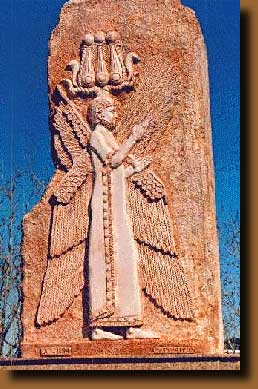
Now I completely understand that there are numerous ways to read texts, and while often times this can be traced to an authors own presuppositions, this limitation should not be used to disregard all readings, there are still good or bad readings. And while I am not familiar with many of John Hobbins' readings I wonder about his assessment of Israel's appropriation of Cyrus, and by implication thier acceptance of his Empires. I am not saying that his reading is wrong, I would just like to tease out some thoughts to see how he responds.
Hobbin's uses the presence of Cyrus in Second Isaiah to argue for a favorable view of Cyrus and his Empire among those in exile. He states:
"On the other hand, Persian imperialism in Isa 40-48 is described in glowing terms. The Persian conquest of Babylonia and the Levant under the leadership of Cyrus was viewed positively insofar as it brought an end to Babylonian imperialism, treated everyone with a measure of respect, and fixed as a goal the extension of its writ to the Aegean isles and coastlands. This passage most likely has Cyrus in mind (Isa 42:1-4)..."
It is true that YHWH's call of Cyrus is important, namely because the text associates him with the redemption of Israel. Cyrus is a depiction of YHWH's power, as the text insinuates it is YHWH who raised up Cyrus from the beginning, it is YHWH who will bring the rulers to nothing, and again it is YHWH through Cyrus who will both destroy Babylon and rebuild Jerusalem. Cyrus is even likened to Moses as the responsible agent in the what might be termed the new exodus, the text even goes on to call Cyrus a messiah and a shepherd, certainly insinuating beyond all doubt that YHWH is clearly affirming him. So Hobbin's is correct that Cyrus and thus by implication his empire is described in glowing terms.
But this is precisely where his argument seems to break down, because despite YHWH's affirmation of Cyrus (obviously depicted through the prophet), it is this very depiction that becomes the center of Israel's argument with YHWH, for it is seemingly YHWH's choice of Cyrus as their rescuer that doesn't sit well with them. Thus in 44.24-28, after YHWH declares himself the creator of all, the confuser of the wise, and the one who commands Jerusalem to be rebuilt, YHWH slips in that, 'it is I who say of Cyrus, ‘my shepherd’ and he will perform all my desire'. Then in 45.9-13 YHWH announces misfortune to those who dare question their maker, pointing out that since he is the creator of all things that he can do what he pleases, exclaiming, 'I have aroused him [Cyrus] in justice’. And again in 46.5-11 YHWH begins by mocking the idea that he can be regarded as an idol, reminding the rebels (Israel) that he alone knows the end from the beginning. He finishes by declaring that he will accomplish his purposes 'calling a bird of prey from the East, the man of my purposes…' And finally in 48.14, YHWH reaffirms that he 'loves him [Cyrus]’, and it is Cyrus who ‘…shall carry out his good pleasure on Babylon'.
The point I am trying to make is that even though the text (as a substitute for the prophet and YHWH) seem to think highly of Cyrus, and his Empire, because they are to be YHWH's agents in freeing his people, the people don't seem to share this opinion. Hence the disputations.
While the question of why this clash between YHWH and Israel over Cyrus, is of course much harder to answer. (It could have been similar to Habbakuk's disappointment with pagan liberators, I am not sure.) The text no doubt uses the rejection of Cyrus, to highlight Israel’s refusal to accept YHWH's plan. Thus bringing Israel’s recalcitrant heart into the open.
So while the prophet may be describing Cyrus in glowing terms, the people are not buying it.
_______________
See Further:
John Goldingay, The Message of Isaiah 40-55: A Literary-Theological Commentary, 253-300.
Lisbeth S. Fried, "Cyrus the Messiah? The Historical Background to Isaiah 45:1," 391.
K.D. Jenner, "The Old Testament and Its Appreciation of Cyrus," Persica 10 (1982): 284.
Ralph W Klein, Israel in Exile, chapter 5.
Rikki Watts, "Consolation or Confrontation," 41-42.




No comments:
Post a Comment